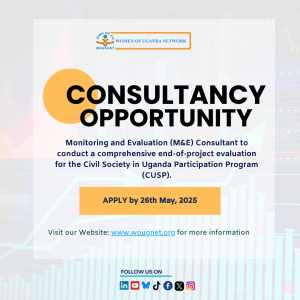1. Introduction
The Civil Society in Uganda Participation Program (CUSP) is a multi-stakeholder initiative aimed at creating a vibrant and resilient civil society and fostering an enabling environment for women-led Civil Society Organizations in Uganda, particularly among marginalised and underrepresented groups.
Implemented in partnership with national and grassroots organisations, CUSP has engaged in various activities including advocacy campaigns, legal and policy dialogue, and awareness-raising on digital and offline rights.
As the project nears its conclusion, an end-of-project evaluation is needed to assess the relevance, effectiveness, efficiency impact, and sustainability of interventions related to women’s freedom of expression and access to information.
- Background
Uganda has made significant strides in recognizing and protecting women’s rights, both domestically and through international commitments. The 1995 Constitution of the Republic of Uganda guarantees equality and non-discrimination based on gender under Article 21. Additionally, Uganda is a signatory to various international treaties and conventions such as the Convention on the Elimination of All Forms of Discrimination Against Women (CEDAW).
Despite the existence of such legal frameworks, there remains a need to address gender disparities and ensure that women are considered in policy formulation processes. Women in Uganda still face numerous challenges for example Technology facilitated Gender-Based Violence. The right to freedom of expression is provided for in Uganda’s Constitution, recognizing the importance of a free press and open public discourse. However, in practice, this right is sometimes restricted, especially concerning dissenting voices and criticism of the government.
Despite the implementation of laws such as the Computer Misuse Act, the rise of online spaces has provided new avenues for expression and access to information. However, it has also brought about new challenges, including online gender-based violence and the spread of gendered misinformation. Challenges and misuse of these laws still persist in the implementation. Many citizens, especially those in rural areas, still struggle to access essential information due to factors such as limited infrastructure, low levels of literacy, and language barriers. Marginalised groups, including women, persons with disabilities, and rural communities, often face additional hurdles in accessing information that directly impacts their lives.
3 . Purpose of the Consultancy
WOUGNET seeks to engage an experienced Monitoring and Evaluation (M&E) Consultant to conduct a comprehensive end-of-project evaluation. The consultant will assess project outcomes, identify lessons learned, and provide actionable recommendations to inform future programming and policy engagement.
4. Scope of Work
The consultant will be expected to:
- To assess the extent to which the project achieved its intended objectives, particularly in relation to enhancing women’s freedom of expression and access to information.
- To evaluate the effectiveness and efficiency of project implementation strategies and partnerships.
- To determine the impact and sustainability of the project on target beneficiaries, especially structurally silenced women.
5. Duration and Timeline
The assignment is expected to take 20 working days, from the contract signing date. Key dates will be agreed upon at the inception meeting. The assignment is expected to run between June to july 2025.
7. Deliverables
- Prepare an Inception report including methodology, data collection tools and proposed work plan.
- Prepare a field report ncluding raw data set,photos, transcripts nd vidoes where need be.
- Prepare a draft assessement report, and present preliminary findings to WOUGNET and partners.
- Prepare a final evaluation report (max 25 pages excluding annexes) including feedback generated from the presentations of preliminary findings, final tools used, informed consent forms, references.
Annexes: Tools used, stakeholder list, photos (where relevant), references.
8. Required Qualifications and Experience
WOUGNET is looking for a competent consultant/ resource person with proven experience in undertaking similar assignments including but not limited to
- Minimum of a Bachelor’s degree in Statistics, Quantitative Economics, Development Studies, Gender Studies, Public Policy, or related fields. A postgraduate diploma or Master’s in Monitoring and Evaluation is an added advantage.
- At least 4 years of experience in participatory evaluation methods and tools to conduct project evaluations, preferably in gender, governance, human rights, or women’s empowerment programs.
- Demonstrated knowledge of gender equality, civic space, freedom of expression, and access to information in Uganda.
- Strong analytical, writing, and presentation skills and Ability to deliver high-quality outputs within agreed deadlines.
9. Application Process
Interested and qualified consultants should submit:
- A technical and financial proposal (combined in one PDF document not exceeding 5 pages), highlighting approach, methodology, experience, and total cost.
- NB: Financial proposals will be evaluated based on the total funds available for the assignment and WOUGNET will enter negotiations with the best-evaluated consultant.
- A detailed Curriculum Vitae (max 2 pages) highlighting similar assignments.
- Two samples of previous evaluation reports or similar work.
Submission of the technical, financial proposal, and Curriculum Vitae should be e-mailed to info@wougnet.org and cc: mgt@wougnet.org, Subject: CUSP M&E Consultant 2025.
Deadline for submission is on or before 5:00 PM EAT on Monday 26th May, 2025.







 May 19, 2025
May 19, 2025  Kampala, Remotely, Uganda
Kampala, Remotely, Uganda  Consultancy
Consultancy 